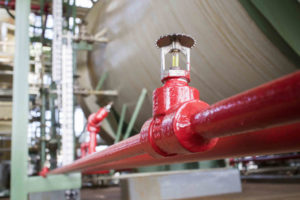
During winter weather, the pipes of your sprinkler systems may freeze and fail to turn on correctly if needed.
Most fire protection systems have a multifaceted approach: there are sensors to detect heat and fire, there are alarms to alert people, and then there are sprinklers or similar systems for fire suppression. Having a working, effective fire protection system gives you peace of mind that your commercial building (or your home for residential fire protection) is always in good hands. If you do have a sprinkler system as part of your fire protection, you have to take care of the pipes for it the same way you do for the rest of your plumbing. During freezing conditions and winter weather, you could find that the lines and apparatus of your sprinkler systems freeze and fail to turn on correctly if needed. Read on to learn tips and tricks to try and prevent this.
What Causes Freezing?
The pipes feeding sprinkler systems have water in them that can freeze in very cold weather, just like any other pipes in your building. When temperatures go below freezing and stay there for long enough, the water can even freeze and expand enough to damage the pipes. Unlike other pipes, you can’t leave your sprinkler system running at a slow drip to keep it from freezing solid. And even a small amount of water can cause a blockage if it freezes. That means that freezing temperatures can cause your sprinkler systems to not work, even if they don’t freeze solid.
What About Dry Systems?
Most people think that all sprinkler systems are wet systems, but many are actually dry systems. Dry systems use pressurized air to fill the pipes instead of water. When the systems turn on the air comes out first and the water follows. This means that any areas of pipe that have to be exposed to freezing temperatures won’t freeze because they have air in them instead of water. However, there can still sometimes be small amounts of water, especially after testing the system, or when changing temperatures cause condensation.
How Can You Prevent Freezing?
Preventative maintenance is the best way to save yourself from the issues that come from a frozen sprinkler system. To prevent issues from pipes being exposed to freezing conditions you should regularly check and empty your point drains. You should routinely complete visual inspections of the entire system looking for any damage that could rupture in freezing conditions. When temperatures do dip below freezing, do pressure checks on your system. Finally, any areas that are exposed to freezing temps should be insulated for protection.
Commercial and Residential Fire Prevention from Judd Fire Protection
If you want to ensure your home and business are safe throughout the year, trust Judd Fire Protection, LLC. We have over two decades of experience designing, installing, inspecting, and repairing residential and commercial fire protection systems. We serve clients throughout Maryland, Pennsylvania, Washington, D.C., Virginia, and West Virginia. If you are interested in finding out more about our services and protecting your home and business, give us a call at 410-871-3480
This entry was posted on Friday, February 11th, 2022 at 11:29 am. Both comments and pings are currently closed.